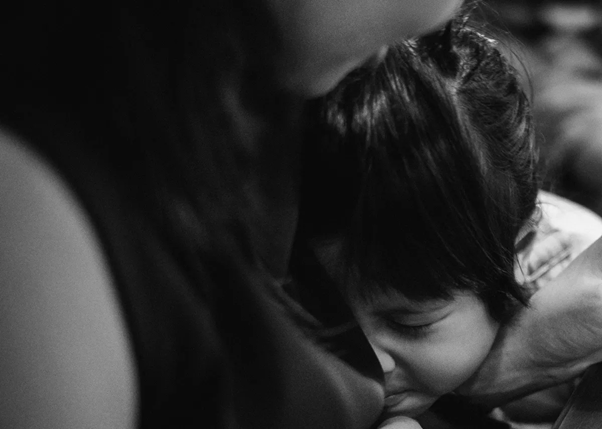Families For Life | My Child Has A Medical Condition - How Do I Navigate Diagnosis Anxiety
Photos taken in collaboration with Larry Toh
As I waited to be seen by the paediatric skin doctor, I gazed at my firstborn, then five-weeks-old, in awe – she was “perfect”. Every day I thanked my lucky stars that even though she was born somewhat prematurely, she seemed to be developing well.
I always knew I wanted to be a mummy. The moment I fell pregnant with my daughter, I began “preparing” for motherhood and plunged myself into as much information I felt was relevant to arm myself for this new journey.
The only thing worrying me now that she was born was an unusual patch of skin that seemed to be increasing in size as she grew.
When we were called into the doctor’s office, he asked to see the skin patch I was concerned about. Pulling out a magnifying glass, he proceeded to examine the white skin patch.
After a few seconds, he looked up and said, “Ah, I know what this is! Your daughter has 'Hypomelanosis of Ito' – or HIT."
He then proceeded to explain to me that there was no treatment for HIT, and instructed me not to Google the diagnosis.
My maternal and psychologist’s instincts went off inside me like a siren, and I found myself in a tug-of-war between my logic and emotions.
I began feeling overwhelmed and had trouble putting my thoughts in order to ask the doctor the appropriate follow-up questions and what the implications of HIT would mean for my daughter in the long run.
It was as though my surroundings became a haze and all I could see was my baby – she was all that mattered.
As I left the doctor’s office with my baby snuggly wrapped in her sling, I found myself confronting questions I never thought I would need to, nor were part of the “preparation” I had gone over during pregnancy.
The mourning was instantaneous, and I began to feel my heart fill up with fear, anxiety, sadness, and anger – that my baby girl’s fate was sealed, and she would no longer have the “normal life” I had imagined for her.
Of course, I barely made it out of the building before I frantically Googled what HIT was, and was bombarded with bad news and an even worse prognosis:
Hypomelanosis of Ito is rare genetic neurocutaneous syndrome
I lost it and began to panic.
I called everyone in my family, who, in turn, panicked even more, and just like that, we ended up collectively mourning over how my daughter was robbed of her ability to enjoy life as a neurotypical person.
But given my clinical background, I knew that the natural feeling of denial as a coping mechanism was a potential trap for me to get caught in.
So, instead of letting it rule my next steps, I decided I had to focus on obtaining early, intensive intervention for my daughter to maximise progress and perhaps improve her prognosis.
I knew I had to face whatever would come our way head-on.

For the first night, I allowed myself to grieve, cry, and curse the universe, but when I woke up the next morning and held my little one, I consciously switched my brain into “I will not give up” mode.
That morning was the first day of our rollercoaster one-year journey of getting four "second opinions", both locally and abroad, as well as calling every friend who was a paediatrician, speech therapist, occupational therapist, or physiotherapist that I knew to ask about the kind of therapy they could offer us.
I exhausted every option that was accessible to me, and I was determined to help my baby experience life to the fullest.
Finally, after one year of searching for answers and remaining hopeful, three out of the four doctors believed that my daughter did not have HIT, as they believed that the condition could only be properly diagnosed with a skin scrape, not a magnifying glass.
To be 100% certain, we had the skin scrape taken, and the patch of skin was officially diagnosed as a birthmark!
However, the emotional experience of grieving and advocating on her behalf had reframed life for me – how to manage my motivations as a parent, and yet, how to never give up.
This is the message I want to share with all the parents out there who are also embarking on their child’s diagnostic journey.

Dr von Auer and her firstborn daughter. Photo courtesy of Dr Vanessa von Auer.
1. Allow yourself to freak out for a limited time period
Feel whatever it is you need to experience and process.
2. Know that you will be going through a natural grieving process and that’s okay!
It’s important to go “through” and not “over” this process as you risk falling into the denial trap.
While the stage of denial is part-and-parcel of the grieving process, please be wary of dismissing your child’s symptoms as this can be detrimental to both your child and you in the long run.
3. Seek comfort from your partner, family and friends
As you process your feelings and thoughts, it is healthy to talk about your worries, fears, disappointments and grief with others.
4. Don’t give up, seek "second opinions" (I got four!)
When it comes to “bigger” medical issues, many hospitals have excellent specialist Child Development Units.
5. Channel your shock, pain, grief, anger and anxiety into “Mama/Papa fight mode”
On behalf of your child, seek appropriate intervention, therapies, or medicine. Early intervention and management is the key to a more positive prognosis and improved development, as well as a better quality of life for everyone involved.
6. Ensure that you take care of yourself
And this holds for any parent, regardless of whether your child has special needs, a certain diagnosis, or not.
Dr Vanessa von Auer is a mother of two, and the clinical psychologist and director at the Von Auer Psychology Centre..She is also the founder and CEO of the Integrated International School, a boutique school with a dual-educational stream approach to learning that caters to typical students in the mainstream, as well as students with unique learning differences.